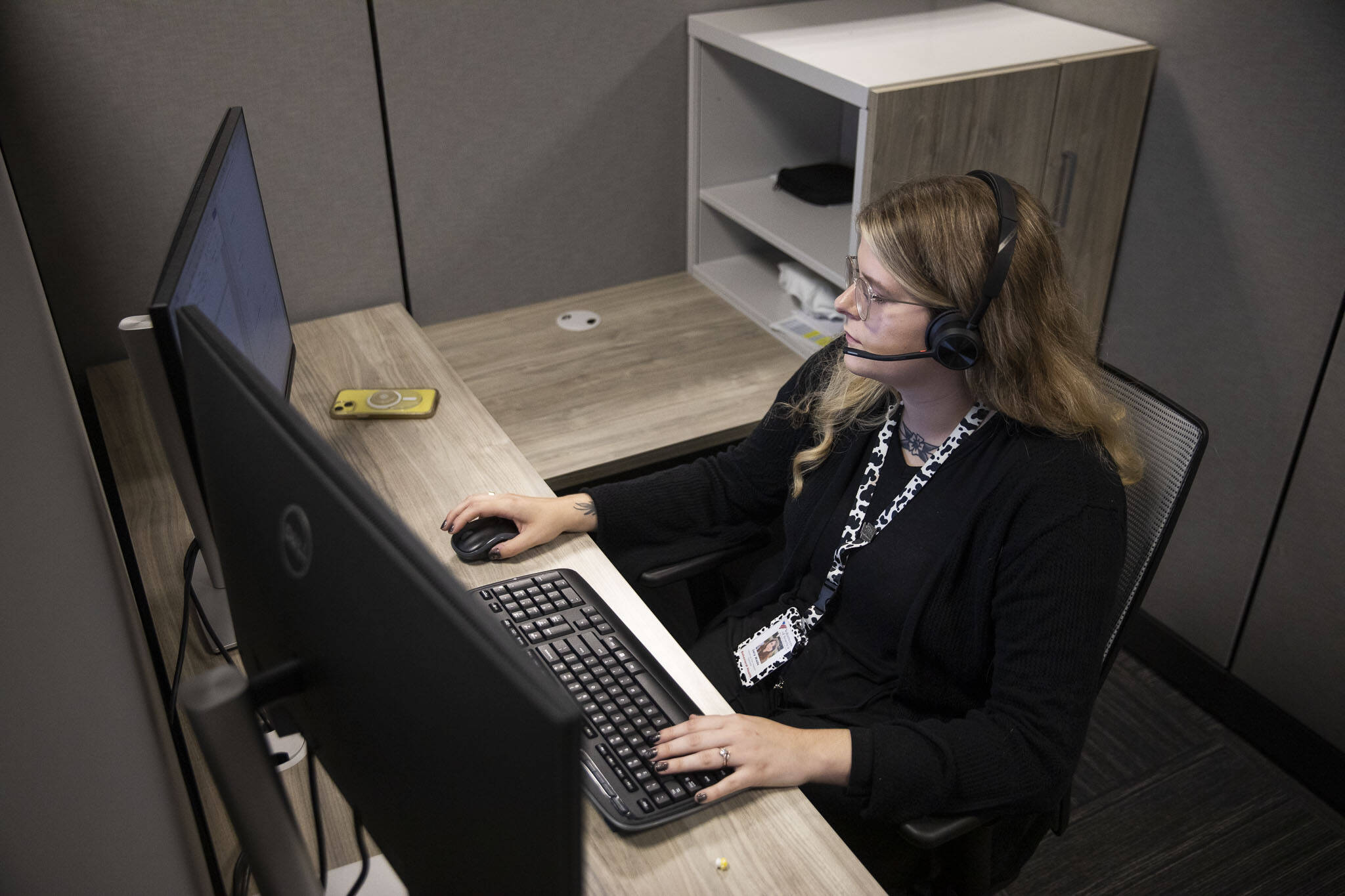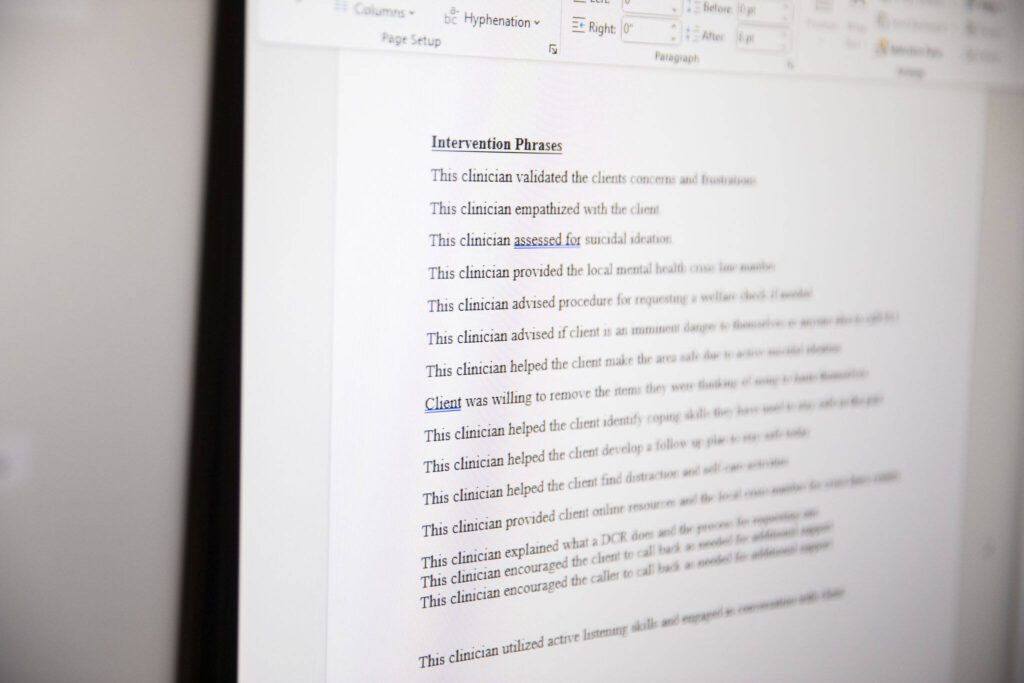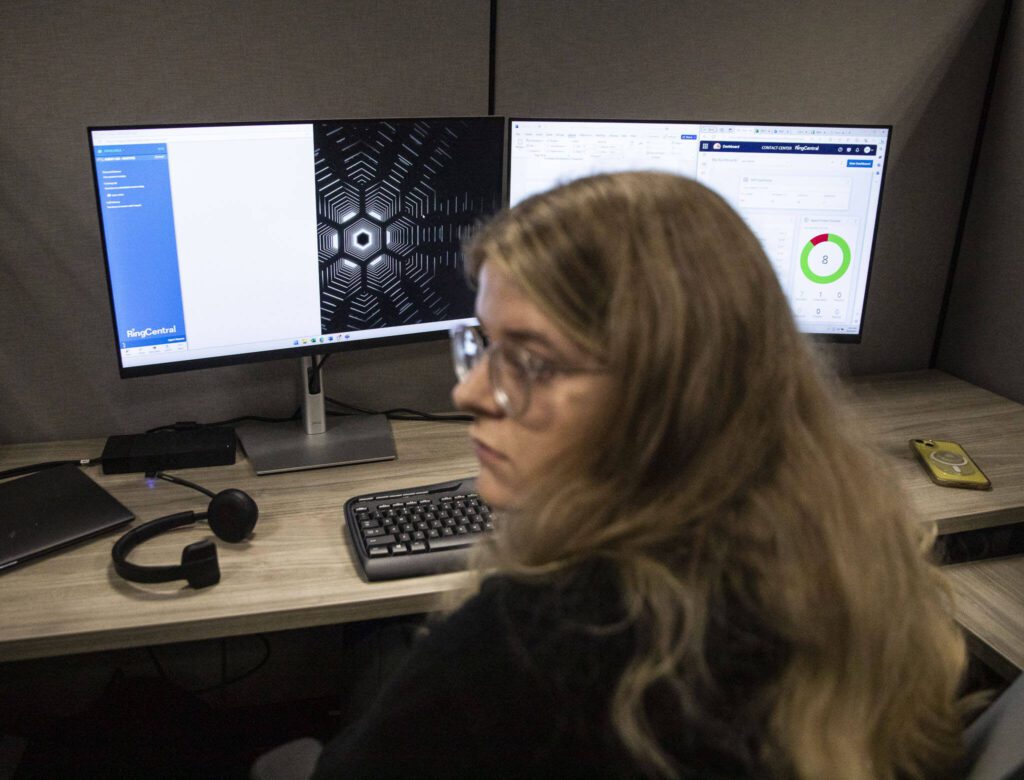EVERETT — The first call lasted just a few minutes.
Jacy Wade recognized the person on the other end of the line and greeted them by name. They talked about the weather (chilly) and how the caller was feeling (tired).
Most of the conversation could’ve passed for small talk between friends.
The only sign anything was amiss came at the end.
“Are you having any thoughts of suicide?” Wade asked gently.
The caller wasn’t. Wade said she was glad to hear it and encouraged them to call back if needed. With that, they hung up.
As a crisis counselor for the 988 Suicide and Crisis Lifeline, Wade has asked that question many times. How many calls she’ll get in a day can be as variable as the weather, sometimes literally — if it’s sunny, fewer people call.
Wade, 27, works at the Volunteers of America Western Washington’s Behavioral Health Crisis Call Center, one of three 988 call centers in Washington. Located in Everett, it covers 32 of Washington’s 39 counties for phone calls and the whole state for online chat and texts.
Since the 988 line launched last year, the call center has received an average of 3,729 calls each month — a nearly 40% increase from when the number was 1-800-273-TALK.
The switchover, enacted by federal law, was intended to make the National Suicide Hotline easy to remember.
“The last thing you’d want to do in a crisis is search for a card you got from your provider three weeks ago or look up the number online,” said Courtney Colwell, director of 988 services at Volunteers of America. Changing the number “so it’s as easy and simple as calling 911 has definitely contributed to the volume increase.”
Staffing levels at Volunteers of America’s 988 services have quadrupled to keep up, going from about 50 staff members to more than 200 in less than two years. And they’re still growing. Phone and text volume is still trending upward, according data provided by Volunteers of America. To keep pace, the center adds new positions every few months.
More than 90% of the center’s employees work remotely. Staffers live all over Washington — and in 26 other states.
Wade is one of 31 crisis counselors manning the phones. Another 29 counselors respond to online chat and texts. Supervisors can also jump in and serve as counselors when they’re needed, like during times of high call volume. Operations run around the clock as the crisis line is available 24/7.
‘They want someone to stop them’
All kinds of people call. Wade has talked to kids as young as 6. At least one person calls the hotline from prison.
This time, the person on the other end of the line was what counselors call a “familiar caller”: someone who calls regularly, just looking for human connection. Wade enjoys those kinds of calls. Since she knows the person, she can help them calm down easier.
It’s not just that, though. She genuinely likes chatting with them. To do this job, you have to care.
“I don’t ever struggle to empathize with people,” Wade said. No matter what people have done, she’s found “there is a reason for every behavior.”
Not everyone who calls the hotline is actively suicidal. But Wade encourages anyone to call who feels a need to. Loneliness left unchecked can lead to thoughts of suicide later, she points out.
When callers need a different kind of support, Wade can direct them elsewhere. One resource she often shares is the Friendship Line, a hotline for older adults feeling isolated.
Callers to the 988 line can also choose to be directed to hotlines for certain groups, including for veterans, LGBTQ+ youth and Native Americans.
The hotline also has a follow-up program in which counselors can check back in with people to help them work toward their goals.
Counselors try to avoid calling 911. Less than 5% of calls end in 911 intervention.
On rare occasions, it’s necessary: when callers have a plan to end their life, the means to carry it out and the intent to do it imminently. If they meet that criteria and are unable or unwilling to work with a counselor to come up with a safety plan, counselors call 911.
Even in those crisis situations, though, “people that are very intent on ending their life typically don’t call and ask for help,” Wade said. Over time, she has come to understand that for many people, “they want someone to stop them.”
‘We’re always here’
When counselors pick up the phone, there’s no way of knowing what will be waiting on the other end.
Some days, every single caller is crying or hyperventilating. Other days, Wade might only hear from familiar callers or people concerned about a friend or family member.
One Friday this month, she got some of both. Though her first caller of the day was calm, others were in more distress. One was struggling with addiction and had recently relapsed.
Wade listened, interjecting at times to offer comfort. “I hear you,” she said multiple times. She told the caller they sounded like a good person with a bright future. They didn’t deserve to die.
Then, she drew on her own experience.
“My own parents used and relapsed many, many times,” she told the caller. “I never stopped loving them, I never stopped hoping for them and I was never disappointed in them.”
Wade gave them the number for the Washington Recovery Help Line (1-866-789-1511). She checked whether they felt they were going to act on thoughts of harming themselves and, as she always does, told them they could call back whenever they need to, “even if it’s in a couple minutes.”
“We’re always here,” she said.
A difficult part of Wade’s job is not knowing what will happen after she hangs up. Counselors can’t solve people’s problems for them or take away their pain. They can only hope they’ve made an impact on people’s lives.
Often, callers thank Wade before they get off the phone. It’s one way she can feel she’s getting through to them.
“I think a lot of times people overthink this job,” Wade said. “And really what it is, is you’re sitting there, you’re listening, you’re offering support when you can. And 99% of the time that’s enough. People just want to be heard and listened to.”
Sophia Gates: 425-339-3035; sophia.gates@heraldnet.com; Twitter: @SophiaSGates.
Talk to us
> Give us your news tips.
> Send us a letter to the editor.
> More Herald contact information.



























